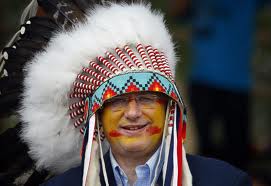I’ll admit it. I was wrong. I thought the Conservative government would never make a real investment in First Nations education.
That is how to admit a mistake. Like an apology, it must be clear and unequivocal.
My mistake was in believing anything Stephen Harper said about First Nations. I should have known better.
He reversed himself in 2010 on the United Nations Declaration on the Rights of Indigenous Peoples. His “no” vote at the UN in 2007 isolated Canada with three other countries against the rest of the world, but the PMO and its typists at all of Canada’s major newspapers insisted it was a principled stand, saving Canada from the evils of recognizing Indigenous rights.
The change of heart three years later was reluctant and, as far as I can tell, driven by the decisions of others. With the arrival of Barack Obama in the White House and a new Labour government in Australia, Harper was entirely alone in his opposition. This was perhaps coupled with the fact it cost nothing to do it. No one even called him on his hypocrisy. None of the media admitted theirs either.
A reversal in which I was personally involved came three years after the Prime Minister had killed the Kelowna Accord – insisting more money wouldn’t help the situation on reserve – when we negotiated $1 billion in infrastructure spending on reserve for the 2009 budget.
Watching him leave 111 Sussex after meeting with all of the Premiers and the leaders of five Indigenous organizations, still wearing the pancake makeup from an earlier television appearance, he had the ghostly pallor of a man sickened by the position into which he had been forced. A capitulation brought on by the fact of a minority parliament and a global economic crisis demanding a stimulus package. That one cost him something, but he was backed into a corner.
The best known of his reversals was the 2008 apology. Whether he wanted to honour the residential schools settlement or not, that was court ordered. But he didn’t want the spectacle of an official apology in Parliament. A lot of players weighed in – with Jack Layton’s role having been acknowledged publicly by Harper himself – and he did the right thing. Again, it cost him nothing.
The latest reversal is different. Having rejected the same arguments about the underfunding of First Nations education for over 8 years, having publicly and vehemently denied the truth of those arguments as recently as October, yesterday the Prime Minister personally announced $1.9 billion in new funding and a commitment to cooperate with First Nations on developing accompanying legislation.
National Chief Atleo says the new arrangement meets the five conditions Chiefs had set down in a resolution this December. Aside from a statutory funding escalator clause, the most important of those conditions was that there be reciprocal accountability. If this turns out to be the case, the greatest reversal yet is still to come, one in which the Government of Canada for the first time takes responsibility for the results its policies engender on reserve. That would be truly remarkable.
But why did it happen? There is no minority parliament to force his hand and no significant shift in global forces. And there is a cost, of which the $1.9 billion is only the beginning.
There are pending legal decisions, a number of human rights complaints over discriminatory funding waiting for the child welfare case spearheaded by Cindy Blackstock to conclude with a finding on behalf of First Nations children.
There is the growth of Indigenous activism – Idle No More and other campaigns – of a strength no past government has faced. And there is the related threat to the Prime Minister’s highest priority from an angry population that has the means, legal and otherwise, to stop oil and gas development.
But these threats are not significantly diminished by this decision. The child welfare case will go ahead and subsequent cases on education will top up yesterday’s commitments in order to reach parity. Activism on the tar sands won’t diminish.
It could be electoral politics, softening his image and, along with upcoming changes to the Elections Act that will suppress First Nations voters, weakening focused and united action on that front.
Or, as with the apology, someone may have prevailed to a better nature this Prime Minister keeps mostly hidden, a capacity to rise above the cold-heartedness that has allowed eight years of suffering he could have prevented. It seems unlikely.
It is also hard to accept that logic prevailed, that the persistent presentation of facts and sound reasoning suddenly mattered. Until yesterday, this government effectively had called those of us making those same arguments liars.
And while this announcement shows where the truth lay, Harper won’t admit that, nor will those in the media and “think tanks” who have slavishly repeated his misrepresentation of the facts.
Although that doesn’t help explain this instance, it may at least explain why these reversals keep happening: he keeps getting away without ever admitting he was wrong.



